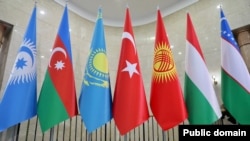“Azerbaijan, as the winning party, rightly declares the need to open the Zangezur corridor, as also provided for in the 2020 [ceasefire] agreement,” Birol Akgun, the Turkish ambassador in Baku, told the Azerbaijani APA news agency.
“The Turkic world needs a corridor for direct communication and that corridor is the Zangezur corridor,” he said. “For the first time since 1937, direct communication will be established between Turkey, Azerbaijan and the [rest of the] Turkic world.”
Akgun echoed Turkish President Recep Tayyip Erdogan’s comments made after a visit to Azerbaijan in May. Erdogan discussed the issue with Prime Minister Nikol Pashinian in Istanbul on June 20. He said afterwards that Armenia has adopted a “more flexible approach.”
Yerevan has rejected until now Baku’s demands for the transit of people and cargo through Armenia’s strategic Syunik province to be exempt from Armenian border controls. Pashinian signaled a softening of this stance after holding talks with Azerbaijani President Ilham Aliyev in Abu Dhabi on July 10. He indicated that he is ready to accept a U.S. proposal to have an American company manage traffic through the corridor.
Russia and Iran have spoken out against the proposal, reiterating that Western powers must stay away from the region.
Syunik is the only Armenian province bordering Iran. Hence, Tehran’s strong opposition to the extraterritorial corridor sought by Baku and Ankara.
A top adviser to Iran’s Supreme Leader Ayatollah Ali Khamenei claimed late last week that the United States as well as “certain pan-Turkist movements” are behind the Azerbaijani demands for the “Zangezur corridor.” Ali Akbar Velayati said they want to “sever Iran’s link with the Caucasus and impose a land blockade on Iran and Russia in the region’s south.” Tehran will thwart their plans with a “policy of active prevention, rather than passive reaction,” added Velayati.




